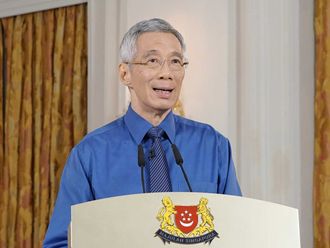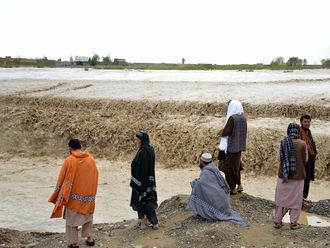Taipei: Old foes China and Taiwan have swapped high-level convicted spies in a sign of goodwill linked to the first meeting ever between their presidents.
Each side released the convicts and allowed them to return home before Chinese President Xi Jinping and Taiwanese President Ma Ying-jeou met on November 7 in Singapore, Taipei’s presidential office said in a statement on Monday.
China released two convicts and Taiwan released one, the statement said. It was issued after the spy swap was reported earlier on Monday by the Taipei-based China Times newspaper, which said the two Taiwanese had been initially sentenced to death in China.
Chinese officials also confirmed the releases, but didn’t say they were part of an exchange.
“This is in accordance with the mutual goodwill due to the Ma-Xi meeting,” Taiwanese presidential office spokesman Charles Chen said in the statement. “President Ma hopes goodwill exchanges can continue and achieve additional specific achievements.”
The two sides have been separately ruled since Chiang Kai-shek’s Nationalists lost the Chinese civil war of the 1940s to the Communists and rebased their government in Taiwan. China regards Taiwan as part of its territory and insists the two sides eventually reunify. That split kept relations icy until Ma took office in 2008 and set aside the political dispute to build trust through talks on trade, transit and investment. His summit with Xi, though it produced no formal agreements, was a capstone of that effort.
China first sent back Chu Kung-hsun and Hsu Chang-kuo on October 13, the China Times said. Both were colonels who had worked for Taiwan’s Bureau of Military Intelligence and were arrested in 2006.
China “kidnapped” them along the Vietnamese border, said Alexander Huang, strategic studies professor and military specialist at Tamkang University in Taiwan. Their rank makes them their government’s highest-level convicted spies in China “in recent memory,” he said.
China and Taiwan periodically ask each other to release espionage convicts, Huang said, and a wife of one of the Taiwanese colonels once travelled to China to press the case.
The two from Taiwan initially received death sentences for espionage, but they were later commuted to 20-year prison terms, the China Times said.
Taiwan followed up with the release of China’s Li Zhihao, the president’s office statement said. Local media said he was about 70 years old and called him China’s “man in black.” He was serving a life sentence, Taiwan’s Defence Ministry said.
“The release took place before the Ma-Xi meeting and was announced only today,” Huang said. “Now people are saying the releases were to show goodwill on both sides before the summit.”
Taiwanese Defence Ministry spokesman Lo Shao-he said the releases were announced in Taiwan because they had been reported by the China Times, and that normally it was “inappropriate” to reveal information in such cases.
China’s Taiwan Affairs Office, when asked about the issue, confirmed the releases in a brief faxed statement, but said nothing explicitly about an exchange with Taiwan.
Many people in Taiwan worry that their government has grown too close to Beijing, giving a lead in opinion polls to the chief opposition party candidate ahead of the Jan. 16 presidential election.
China is asking that Taiwan return a second person convicted of espionage, the China Times reported.












